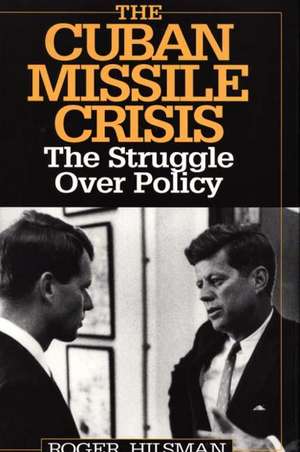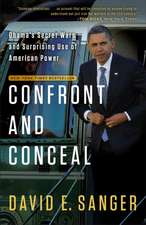The Cuban Missile Crisis: The Struggle Over Policy
Autor Roger Hilsmanen Limba Engleză Hardback – 19 mar 1996 – vârsta până la 17 ani
Preț: 436.99 lei
Preț vechi: 707.30 lei
-38% Nou
Puncte Express: 655
Preț estimativ în valută:
83.62€ • 87.71$ • 69.61£
83.62€ • 87.71$ • 69.61£
Carte tipărită la comandă
Livrare economică 01-15 aprilie
Preluare comenzi: 021 569.72.76
Specificații
ISBN-13: 9780275954352
ISBN-10: 0275954358
Pagini: 192
Ilustrații: index
Dimensiuni: 156 x 235 x 15 mm
Greutate: 0.48 kg
Editura: Bloomsbury Publishing
Colecția Praeger
Locul publicării:New York, United States
ISBN-10: 0275954358
Pagini: 192
Ilustrații: index
Dimensiuni: 156 x 235 x 15 mm
Greutate: 0.48 kg
Editura: Bloomsbury Publishing
Colecția Praeger
Locul publicării:New York, United States
Notă biografică
ROGER HILSMAN graduated from West Point in 1943, was severely wounded serving with Merrill's Marauders in Burma, and later commanded a battalion of guerrillas operating behind the enemy lines. He He earned masters and doctoral degrees in world politics at Yale, taught at Princeton, and then served as deputy director of the Congressional Research Service. In 1961 President Kennedy appointed him Assistant Secretary of State for Intelligence and Research and later Assistant Secretary for Far Eastern Affairs. In 1964, he resigned to accept a professorship at Columbia University. He has authored or coauthored 14 books examining American foreign policy and diplomatic and military affairs. His wartime memoir, American Guerrilla: My War Behind Japanese Lines was published in 1990.
Cuprins
PrefaceThe Soviet DecisionThe Intelligence StoryThe Intelligence Post-MortemThe First American ReactionThe Question of Soviet MotivesThe Policy DecisionsThe ResolutionThe AftermathThe SignificanceIndex









